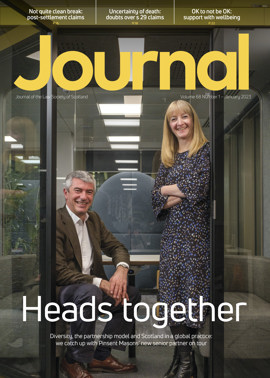Civil court: Expenses – barred by delay?
It’s not often that unreported decisions in family law cases have implications for other civil practitioners, but the decision in RM v JG [2022] SC LER 36 (31 October 2022) raises important questions relative to the enforcement of awards of expenses, in particular in actions where final judgments were made prior to 29 April 2019.
The court was asked to determine whether lengthy delay in seeking taxation of an award of expenses could justify dismissal of an action. After hearing from counsel for both parties, Sheriff Cruickshank found that it could not and refused JG’s motion for dismissal. His decision may be the subject of an appeal.
The background to this case is unusual and noteworthy. RM raised an action for contact with his child in 2011. He later initiated minute proceedings for contempt of court, alleging JG’s failure to obtemper court orders for contact. Following proof JG was found guilty of contempt; RM was also successful in the principal action. He was awarded expenses as taxed in July 2015 and June 2016 respectively.
RM did not attempt to enforce either award for over five years. During this period neither party raised the matter of expenses. When the first award was made, JG was living in a property in Shetland which was owned by her grandfather. She had no significant assets. In August 2015 the title was transferred into her sister’s name. In July 2020 her sister transferred the title to JG. In June 2022 JG, having decided to relocate to mainland Scotland, transferred the property back to her sister. JG maintained she was not aware that RM was then seeking to recover the expenses.
In May 2022 RM lodged for taxation an account which exceeded £220,000 including counsel’s fees. Before the taxation, JG lodged the motion to dismiss in terms of OCR, rule 15.7. The basis for dismissal was inordinate and inexcusable delay by RM or his agent in progressing the action, resulting in unfairness.
Submissions for dismissal
Counsel for JG’s primary contention was that despite final judgments having been given in 2015 and 2016, the court could dismiss the action under rule 15.7. The action remained in dependence despite the final orders, as it remained possible to seek variation of s 11 orders for children by minute. There had been inordinate and inexcusable delay in bringing matters to a conclusion.
Counsel sought to rely on the fact that JG’s principal agent had retired from practice and her current solicitor had insufficient knowledge of the case to comment on the lengthy account of expenses. JG would not have taken title to the property had she known that RM intended to pursue the award. Having transferred the property back to her sister, she had insufficient assets to meet a decree. If the taxation went ahead and decree was extracted she would be declared bankrupt and the transfer would be challenged as a gratuitous alienation. That would result in unfairness to JG.
Reference was made to ECHR article 6. Although there was then no rule requiring the account of expenses to be lodged within a specified time (the four month rule having only been introduced for final judgments from 29 April 2019), the court ought to require determination of liability within a reasonable time, and ought to consider whether a fair trial had been prejudiced. Allowing the account to be taxed at this stage was incompatible with article 6.
Counsel further argued that RM’s right to lodge an account for taxation had prescribed after five years. (This required a somewhat strained construction of the 1973 Act.) Lastly, counsel founded on mora, taciturnity and acquiescence. Given the length of time which had passed without steps being taken to pursue the expenses, and her article 6 right, JG was entitled to proceed on the basis that expenses were not to be pursued. She was clearly prejudiced as she would not have accepted the gift of the property had she known that RM would attempt to recover the expenses. Acquiescence or prejudice could be inferred where mora and taciturnity were established.
Decision
Acknowledging the considerable importance of the matter for the parties, Sheriff Cruickshank refused the motion based on his interpretation of rule 15.7. He did not accept that the action was still in dependence, given that final orders had been made in 2015 and 2016, thus rule 15.7 could not operate. To find otherwise would provide JG an opportunity to appeal against the awards of expenses made by the court.
In any event Sheriff Cruickshank considered that the tests for rule 15.7 were not met. Although the delay could be categorised as inordinate, it was not inexcusable. RM did not wish to incur the expense of having an account prepared and going to taxation if there was no prospect of recovery. That was excusable. The prospect of recovery only arose in 2020 when title to the property was transferred to JG.
JG’s further arguments were beyond the scope of rule 15.7, but would have been refused in any event.
Beyond the above reasons and the sheriff’s comments about the delay which was inordinate but not inexcusable, there is no reference to JG’s arguments about human rights. It remains to be seen whether this will be a feature on appeal.
Regulars
Perspectives
Features
Briefings
- Civil court: Costs – the tail that wags the dog
- Licensing: Keeping alcohol out of sight
- Planning: A framework for sustainability?
- Insolvency: When is a creditor not a creditor?
- Tax: A new, improved autumn statement?
- Immigration: First stop Rwanda?
- Scottish Solicitors' Discipline Tribunal: January 2023
- Civil court: Expenses – barred by delay?
- Property: Transparency, human rights and the registers






